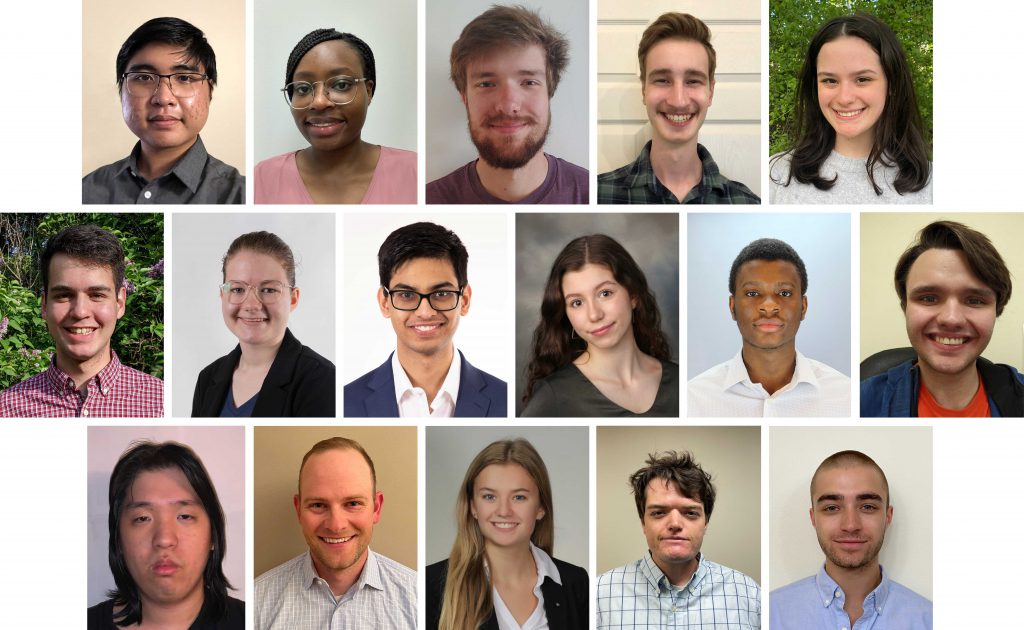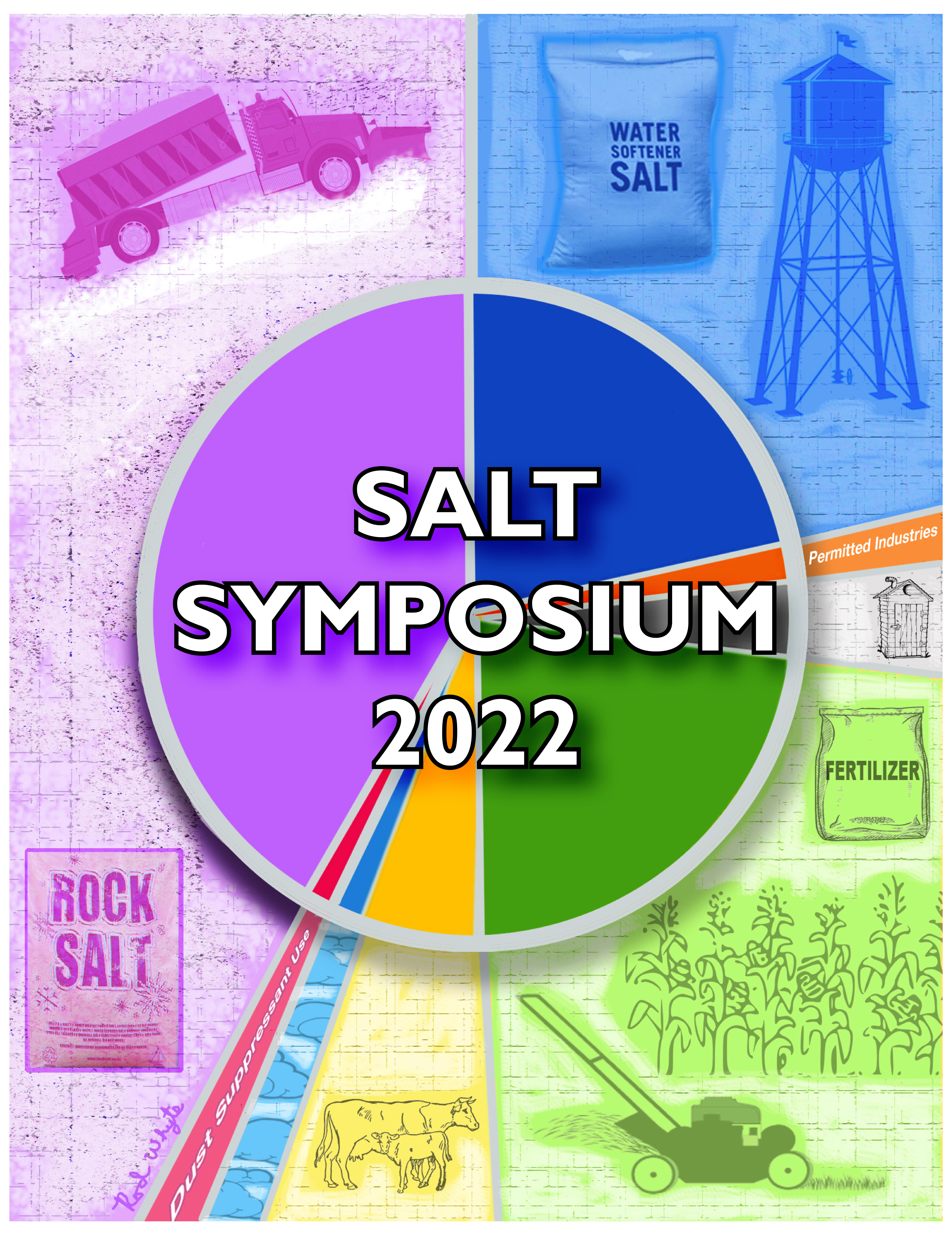July 2022
Inside the Newsletter:
2022 Symposium | Waste Reduction | Energy Efficiency | Water Conservation | Salt Symposium | Intern Symposium | Funding Opportunities
2022 MnTAP Intern Program to Wrap up with Symposium
Summer in Minnesota passes too quickly. Here at MnTAP we are working with our 2022 MnTAP Intern Cohort to wrap up their projects and summarize all the recommendations made. Help us celebrate the accomplishments of the 2022 MnTAP interns as they wrap up their summer projects. MnTAP staff are grateful that in collaboration with our sponsors, host companies, and interns, we have been able to carry out safe, high-impact projects for pollution prevention, energy and water efficiency during the 2022 MnTAP Intern Program.
This year’s event will feature 16 projects that span a variety of industries and focus areas. MnTAP’s intern cohort has been hard at work identifying solutions and best practices that bring savings to MN businesses, organizations and communities.
Don’t miss out! The 2022 MnTAP Intern Symposium is scheduled for Wednesday August 17, 2022 from 12:00 – 4:30 pm CDT. This event will be streamed live from the Symposium venue at McNamara Alumni Center at the University of Minnesota. Register now and get this fun, informative event on your calendar!
For More Information, Contact:
Matt Domski – Intern Project Manager
612-624-5119
mdomski@umn.edu
Beckman Coulter takes Reduce, Reuse, Recycle to Heart
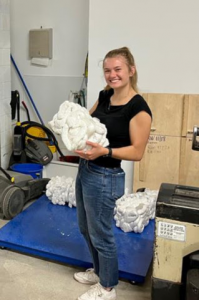 You have probably heard the slogan “reduce, reuse, recycle”. This summer, the team at Beckman Coulter is finding new ways to reduce waste, with the help of MnTAP intern Nicole Thompson. At their facility in Chaska, Minnesota, Beckman Coulter Diagnostics manufactures diagnostic systems for biomedical testing in hospitals, physician offices and laboratories. In striving to be a zero landfill company, Beckman Coulter turned to the MnTAP intern program to help their Sustainability Team drive implementation and reach their short term goal of 15% waste reduction by 2024.
You have probably heard the slogan “reduce, reuse, recycle”. This summer, the team at Beckman Coulter is finding new ways to reduce waste, with the help of MnTAP intern Nicole Thompson. At their facility in Chaska, Minnesota, Beckman Coulter Diagnostics manufactures diagnostic systems for biomedical testing in hospitals, physician offices and laboratories. In striving to be a zero landfill company, Beckman Coulter turned to the MnTAP intern program to help their Sustainability Team drive implementation and reach their short term goal of 15% waste reduction by 2024.
Reduce
An important first step in eliminating waste is looking for ways to prevent waste from being produced. With this in mind, Nicole is contacting suppliers to identify products with less packaging. She found an office paper option that eliminates plastic packaging, replacing it with a simple paper wrap, resulting in several pounds of packaging reduction and a 25% cost savings! The next opportunity she is exploring is to eliminate disposables from the cafeteria.
Reuse
Currently, Beckman Coulter packages bottles of substrate solution for use with their diagnostic machines using conventional disposable pallet packaging. Nicole is working with a vendor to replace this with reusable plastic packaging eliminating wood pallets, cardboard, and plastic wrap.
Recycle
Some materials, such as polystyrene foam and plastic film, are unavoidable, but difficult to recycle through standard processes. Beckman Coulter is teaming up with Healthy Planet Healthy People Alliance (HPHPA), a local non-profit startup which collects expanded polystyrene (EPS) foam and densifies it so it can be recycled into new products. Nicole designed satellite collection areas around the facility, helped purchase a large shipping container to collect and store the foam until pickup, and trained employees on the new process.
For More Information, Contact:
Jane Paulson – Senior Engineer
612-624-1826
janep2@umn.ed
Shearing Energy Bills with Faribault Woolen Mill
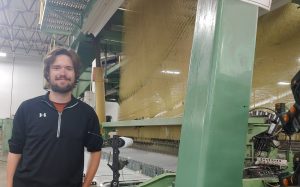 Faribault Woolen Mill is a wool manufacturer located in Faribault Minnesota. The company has been making products such as blankets, throws, scarves and accessories in their current mill since 1892. MnTAP intern Payton Buendorf is partnering with Faribault Woolen Mill to explore opportunities to save energy and optimize natural gas use.
Faribault Woolen Mill is a wool manufacturer located in Faribault Minnesota. The company has been making products such as blankets, throws, scarves and accessories in their current mill since 1892. MnTAP intern Payton Buendorf is partnering with Faribault Woolen Mill to explore opportunities to save energy and optimize natural gas use.
Woolen mills are large industrial manufacturing sites that use energy in the form of motors, compressed air, lighting, and water heating to make woolen products. In order to quantify the opportunity, Payton collected information, developed solutions, and calculated savings potential in each area. Payton completed a lighting assessment and is requesting quotes to help the facility upgrade from linear fluorescent to linear LED lighting, a lighting energy savings of almost 50%. He identified compressed air leaks ready for repair which will help reduce compressor energy consumption. He completed a motor audit and created a calculator for the facility team to help them to make sustainable and efficient decisions on when to repair versus upgrade their motors. Finally, he is investigating the site’s hot water needs and water heater capacity to find a cost-effective solution to increase the uptime of the wool washing process to accompany other facility upgrades which will help to increase production.
The next steps towards implementation of these energy savings opportunities are to:
- Finalize the selection of a contractor to install LED lighting.
- Repair compressed air leaks.
- Utilize the motor calculator to guide repair versus replace timings for motors.
- Consider installing a new water heater to improve production capacity.
Payton is wrapping up his calculations on these efficiency strategies that will help the mill to save energy and boost production capacity.
For More Information, Contact:
Jon Vanyo – Engineer
612-624-4683
jvanyo@umn.edu
No Horsing Around – Decreasing Waste and Improving Throughput
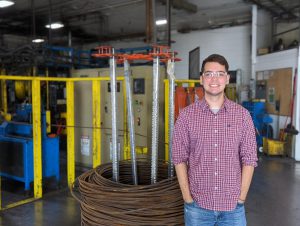 Mustad USA is the leading manufacturer of steel horseshoes in North America. Located in Forest Lake, MN, the forge supplies over 500 varieties of horseshoes and employs 85 people. MnTAP Intern Nathan Miller has been working to decrease waste, reduce downtime, and conserve energy.
Mustad USA is the leading manufacturer of steel horseshoes in North America. Located in Forest Lake, MN, the forge supplies over 500 varieties of horseshoes and employs 85 people. MnTAP Intern Nathan Miller has been working to decrease waste, reduce downtime, and conserve energy.
Steel dies and punches are used to form horseshoes. Due to the intense pressure and temperature of the forging process, they naturally wear down to a point that impacts quality. This requires production to halt while employees replace them. Nathan is experimenting with new materials for the dies and punches that have improved wear resistance. This should decrease the frequency of die and punch changes, reducing both steel scrap and downtime. Additional savings are expected from decreased machining time, heat treatment, and nitriding.
Nathan is also pursuing a variety of additional savings opportunities. He is
- Launching the bidding process for a LED retrofit in the warehouse
- Testing smaller die sizes to reduce scrap
- Implementing a shut off protocol for punch/trim and clip press motors to reduce idling
- Investigating stronger robot grippers
- Collaborating with maintenance to reduce time required to re-teach robots.
Nathan is enjoying the opportunity to apply his engineering knowledge to real-world applications and make a meaningful difference at Mustad USA.
For More Information, Contact:
Gabrielle Martin – Associate Engineer
612-624-0206
gmartin@umn.edu
Salt Symposium 2022 – August 2-3 Online
Stay current in the chloride conversation
Salt Symposium is dedicated to increasing awareness of the effects of chloride use and inspiring changes that lead to a lower chloride future.
Topics our experts will cover during the two-day event
- Drinking water, wastewater, and water softening
- Fertilizer, soils, and erosion control
- Citizen involvement
- Winter maintenance
- Snow and ice management future concepts
View the Agenda
Save the Date! 2022 MnTAP Intern Symposium
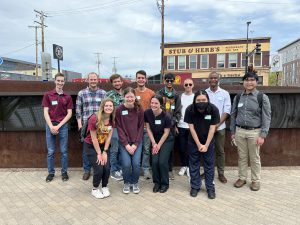 Plan to attend the 2022 MnTAP Intern Symposium scheduled for Wednesday August 17, 2022 from 12:00 – 4:30 pm CDT. This event will be streamed live from the Symposium venue at McNamara Alumni Center at the University of Minnesota. Register now and get this fun, informative event on your calendar!
Plan to attend the 2022 MnTAP Intern Symposium scheduled for Wednesday August 17, 2022 from 12:00 – 4:30 pm CDT. This event will be streamed live from the Symposium venue at McNamara Alumni Center at the University of Minnesota. Register now and get this fun, informative event on your calendar!
MnTAP is proud to host 16 interns at companies throughout the state this summer. All the interns for the 2022 MnTAP Intern Program cohort have reported to their company sites and have begun working on their projects. In three short months, these same students will have collaborated with their company hosts to scope and launch implementation of projects to use materials more efficiently, reduce waste, decrease use of hazardous materials, improve energy efficiency, and save water. This will be an inspiring afternoon that you will not want to miss!
Funding Opportunities
Dry Cleaner Cost Share Program
Minnesota has banned the use of Perchloroethylene (perc) as a dry-cleaning solvent starting in 2026. This cost share funding can help your dry-cleaning business switch away from perc.
Awards:
Up to $20,000 per applicant
Awards will be made to eligible applicant on a first come, first served basis. Early application improves the chance of funding availability.
Eligible Applicants:
Owners/operators of dry cleaning facilities in Minnesota that use or are eliminating PERC.
Eligible projects must eliminate PERC.
Application Deadline:
Monday April 1, 2024
The RFP will remain open and application accepted on a rolling basis until all dedicated funds have been dispersed, whichever comes first.
Applicants are encouraged to take advantage of matching fund opportunities such as the MPCA Small Business Loan Program which covers equipment costs up to $75,000 at 0% interest.
LEARN MOREIf you are a small dry-cleaning business owner and would like assistance applying for this grant, please contact MnTAP at 612-624-1300 or email MnTAP at mntap@umn.edu and leave your contact information.
Refrigerant Emission Reduction Grants
Awards:
Up to $20,000 per applicant with at least 25% match
projects will replace existing refrigeration equipment with new equipment that uses a refrigerant with at least 50% less GWP.
Eligible Applicants:
Must operate a refrigeration unit in a retail setting in Minnesota.
For-profit businesses applying must have ≤250 full-time employees. Governmental entities, non-profit organizations, tribes, and educational institutions may have any number of employees.
Application Deadline:
August 31, 2022, 4:00 pm CDT
LEARN MOREIf you are a small business owner and would like assistance applying for this grant, please contact MnTAP at 612-624-1300 or email MnTAP at mntap@umn.edu and leave your contact information.
